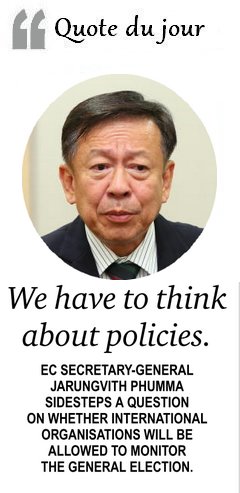
The Election Commission (EC) will decide whether to allow foreign organisations to observe the general election, Prime Minister Prayut Chan-o-cha said Monday, amidst growing calls to bring in international monitors.
"It is the business of the EC to consider and it's our job to create transparency. Everyone must collaborate to ensure a credible election process," he said.
When asked if this means foreign organisations will be allowed to observe the election process, he declined to comment.
Foreign Minister Don Pramudwinai has so far opposed the idea of allowing non-residents or foreign organisations to observe the polls but has welcomed embassy staff involvement.

According to media reports, Mr Don said the EC had sought the ministry's view on election observation by foreigners. In his opinion, non-residents or foreign organisations should not take part since it would be viewed as bringing in "outsiders".
Pheu Chart Party's deputy spokesman Rayut Boontan called on Gen Prayut to take a stance on the issue, saying if the government supports the idea, the EC is likely to comply.
He said even though the EC is an independent agency, it seems to lend its ear to what the regime has to say. "If the government makes itself clear that it favours local and foreign organisations observing the election, the EC will take its cue," he said.
In his opinion, both domestic and international groups should observe the entire process, adding that the new election laws are viewed with scepticism as they appear to favour certain players.
Mr Rayut also took Mr Don to task for his view against allowing foreign observers to monitor the elections, accusing the foreign minister of being narrow minded.
He said Myanmar's elections in Nov 2015 were open to outside observers including the People's Alliance for Credible Elections (Pace), and the absence of these international bodies would cast the country in a bad light.
Pheu Chart's secretary-general, Linda Cherdchai, said the government should send out invites to show it is serious about ensuring an open and fair election and clear itself of criticism that it is intervening in the EC's work.
Chartthaipattana Party leader Kanchana Silpa-arch said she agrees with calls for the government to allow foreigners to observe the process.
She said the country has everything to gain from allowing international monitors.
According to EC secretary-general Jarungvith Phumma, the EC's Office normally invites foreign counterparts to observe the election process as a standard practice. These observers monitor the management of the election process, the campaign, and related preparations and write up reports for peer review.
He said if other foreign agencies are interested in observing the process, they have to submit their requests to the EC.
Asked about guidelines or criteria that the EC uses when considering these requests, he said he did not have information at hand but admitted allowing foreign observers would bolster confidence in the process.
Also on Monday, Khunying Sudarat Keyuraphan, head of the Pheu Thai Party's strategic committee, urged the EC to explain how its draft regulations for election campaign leaflets and posters would help the process.
The veteran politician was reacting to media reports that images that appear on an MP candidate posters may not include anyone else other than the candidate, the party leader or prime ministerial candidate nominated by the respective party.
She said while parties would have to comply with the regulations, the EC owes the public an explanation as to how these prohibitions are in their best interest.
"The EC should prove it is not under the thumb of those who want to return to power," she said.
The EC is to hold a meeting with parties tomorrow to gather opinions about the draft regulations, which are expected to include limits on campaign spending and the sizes and contents of campaign posters and leaflets.
The design of the ballot papers is also likely to be raised during the meeting. The EC sparked an outcry when it is suggested that the logos and names of parties may not be included on the papers.
Elsewhere, leaders of parties have taken to the provinces to recruit members and meet potential candidates and voters after the regime last week lifted the ban on political activities.
Thai Raksa Chart key members led by leader Preechapol Pongpanich went to Phitsanulok while the Pheu Thai team led by Khunying Sudarat turned up in Phuket.
